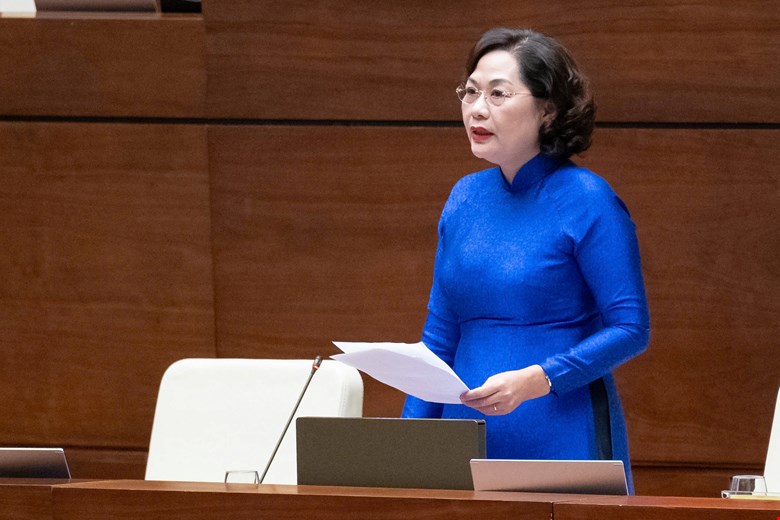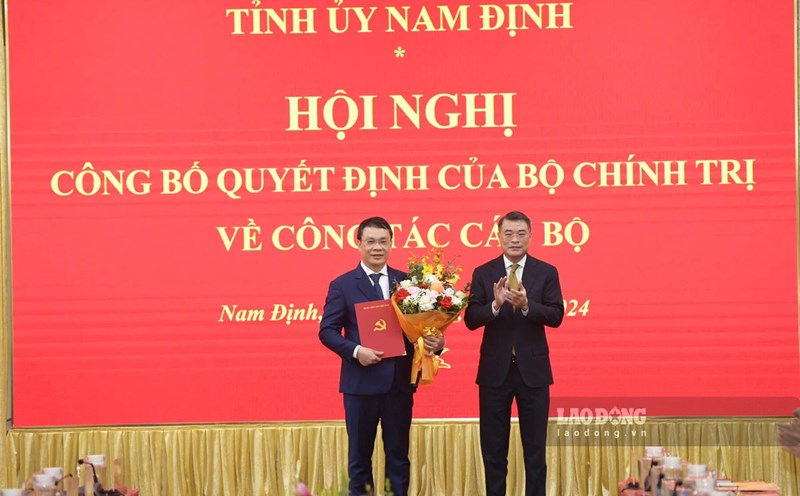On November 11, continuing the 8th Session, the National Assembly conducted a question and answer session.
At the beginning of the question-and-answer session, delegates asked State Bank of Vietnam (SBV) Governor Nguyen Thi Hong about gold management.
Delegate Luu Van Duc (Dak Lak Delegation) said that on April 14, 2024, the Government Office issued Notice No. 160 on the Prime Minister's conclusion at the meeting to discuss solutions to manage the gold market in the coming time.
In particular, assign the State Bank and relevant ministries and agencies to urgently, seriously, fully, effectively and promptly implement tasks and solutions to stabilize and manage the market.
Delegate Luu Van Duc asked the Governor of the State Bank to tell him how the above request has been implemented in the past and what impact it has had on the current and future domestic gold price and gold market?
Delegate Pham Van Hoa (Dong Thap Delegation) said that recently voters have reported that some banks are allowed to sell SJC gold bars to people but do not buy them. This has led to people taking gold purchased from banks to other stores to sell.
"Besides, why are they only sold in Ho Chi Minh City and Hanoi, but not in other provinces? How long will the sale last?" - delegate Hoa asked.
Responding to National Assembly delegates, Governor of the State Bank of Vietnam Nguyen Thi Hong said that the fluctuations in the Vietnamese gold market are due to the general situation in the world.
Although the State Bank has advised the Government to issue Decree 24 and implemented many stabilization solutions since 2013. From 2014 to 2019, the gold market was stable and demand for gold decreased.
However, at the beginning of 2021, the world gold price increased sharply. Until 2021-2024, the State Bank did not intervene. In June 2024, when the international gold price peaked, the difference between domestic and international gold prices was large. Therefore, the Government and the State Bank also based on the reality and organized the auction.
“In the new context when the world gold price reached its peak, the market's expectations were high, so the State Bank intervened through 9 auctions,” said the Governor.

At the same time, to narrow the gap between domestic and international gold prices, the State Bank switched to direct sales through four state-owned commercial banks and SJC. After implementation, the gap between domestic and international gold prices decreased from VND15 million/tael to VND3-4 million/tael.
However, the Governor of the State Bank said that the gold market continues to be unpredictable, because our country cannot produce it, so intervention depends on the world. The State Bank will closely monitor to make policies and operations.
Responding to delegate Pham Van Hoa's question about why he "sold but not bought", the Governor said that when evaluating the gold market from 2014 to present, the State Bank did not supply gold bars to the market because the State Bank had a monopoly on the production of gold bars.
In the context of increasing demand for gold, the State Bank has not raised the issue of buying back. For state-owned commercial banks, when selling gold during this period, the State Bank mainly implements the solution of increasing gold supply.
Currently, there are 22 credit systems and 16 businesses trading in gold bars.
"These banks and businesses buy and sell gold normally, but the story of businesses not buying gold from individuals is because they balance money or for some other reason" - Governor of the State Bank of Vietnam Nguyen Thi Hong clearly stated.
Speaking at the debate session regarding the purchase/sale of gold bars by the State Bank, delegate Pham Van Hoa said that the State Bank sells gold bars but does not buy them back from the market, forcing people to sell gold on the black market.
Delegates suggested that banks consider buying back gold bars from people to facilitate them when they need to sell gold.











